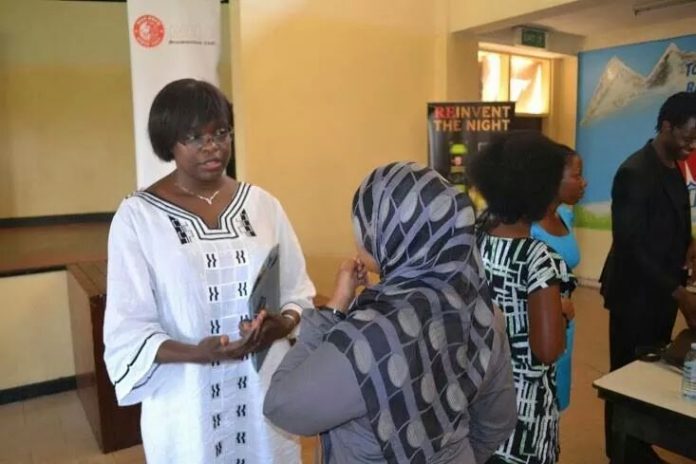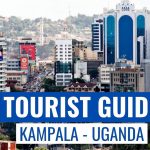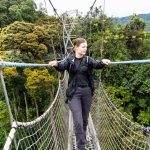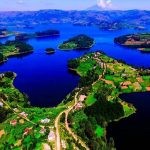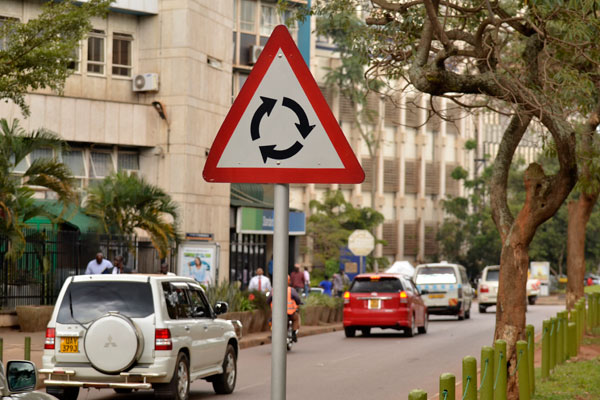When she is not blogging, her mind is preoccupied with creating community transformation, enabling girls to understand menstrual hygiene and being able to offer people other options of life other than the exam passing skills imparted by schools is what she is doing in Ruhanga, South Western Uganda. Her Name is Ida Horner Bayiga.
Her Passion led her to start the Africa On The Blog, run the Let Them Help Themselves (TLHT) foundation and Ethnic Supplies these are are all peieces that fit in her dream of changing her world.
This is Uganda caught up with Ida, to share with us her passions, dreams and what she is doing to make her world a better place.
How did you start all this?
It’s that sort of realization that you can do something, I felt that I could reach out to those that were less fortunate, so I started by exporting handcrafts and textiles made by women and all was going well until the recession hit.
A friend of mine, Ann McCarthy on knowing what I was doing invited me to have a look at something she had started in Ruhanga, so I came back to see her project, she was out of her depth, I mean it’s a remote village, no water, no medical center, no school, no means of money generation and whatnot. So, I setup a charity Let Them Help Themselves out of poverty (LTHT) and over the years, we have accomplished a lot. Now we have a school for 500 pupils, running water etc and right now, we are focusing on skills development like tailoring skills, computing, menstrual hygiene and one of the reasons I am here this time is to review this project, where do we go from here, did it actually help, is there any one particular activity that they really really want us to develop further and to see what works and what doesn’t.
So, what is Let Them Help Themselves really about?
Our core value is community regeneration, so we speak to the community to try and understand what there issues are, to try and understand why those issues have not been addressed, whose role it is to address them and where the blockages are and those are the things that prevent people from becoming economically active because, if a woman is spending most of her time of the day collecting water and making sure that that water is safe, she doesn’t have time to go and earn an income.
If a young girl is spending a week or so without going to school because of lack of menstrual hygiene, it impacts her negatively, so we try and have such conversations with the communities so we can forge a way to try and help.
We see our role as people who want to remove blockages at prevent them from becoming economically active, we also look at transformation using the skills development initiative where if a young girl learns a skill, it becomes handy even if she dropouts at age 15 or 16, wherever they land, they can easily find employment or create a job for themselves because people have to have options.
What else are you involved in?
We are also involved in Humanitarian causes/emergencies, here in Uganda we were involved in the Bududa Landslides and also in some slum project in Kireka where were helping women refugees at a quary to sell their handcrafts. Also during the Ebola Outbreak In Sierra Leone, the Sierra Leone diaspora came to us and we helped to provide people food in the treatment centres as their families neglected them because they were suffering from Ebola.
How do the people of Ruhanga take it in, that an outsider, a stranger is trying to help them?
It’s not easy, and it hasn’t been easy since 2008. It’s about negotiating and building relationships because we are all about transformation and giving communities other options, so having those conversations and knowing the power structures in the community, has been a bonus for us, It has helped us help them. it’s actually a privilege that they allow us to help them, but if you come with an “I know best” point of view or from an imperialistic stance, then forget it. The people of Ruhanga have learnt to accept us in and we respect that.
LTHT is mainly based in Ruhanga but, do you have any plans of widening/spreading this campaign to other places?
It’s possible, I mean, Yes we can do it but honestly, it all comes down to finance, if you dont have the funds to travel around, to pay your employees, you can dream and dream and nothing happens. And also we don’t get any funding from the UK government or the Ugandan government so we rely on individual donations, that’s how we have and are still doing it But also there is still a lot of work to do in Ruhanga, were trying to build a model and a blue print that someone can look at and take away and also replicate because it’s basically developed organically. So for now, widening and spreading is just in the pipe line.
What is ethnic supplies?
Ethnic supplies is about helping people who make handcrafts and textiles to access the market in Europe, before the recession, it was turning a small profit but after the recession it isn’t easy anymore, people priotise where and on what they are spending their money on.
How does ethnic supplies work, I mean If I wanted in, how would I go about it?
The basic principle is that we don’t work with any one group that we haven’t met, so part of my role is to travel and meet these groups and the idea behind that is to check out their employment practices in every sense of the word. So for you/your group to join, we have to have met the group and have established that you have transparent and fair employment practices.
Looks like you have been beaten to the better part of fairness, what are those things that you look at to measure or ascertain good/acceptable employment practices?
I have a very high sense of ‘fairness’, I hate seeing someone being unfair to someone else, be it a person or a brand, I don’t like people being undercut and cheated & people not getting their wage because let’s face it, most people don’t know their rights and employers use that to terminate their contracts unjustly and to manipulate them so, unethical employment practices are exactly what I am against.
What are some of those things that have enabled you to get where you are?
Social capital! Social capital allows you to get a long way which gives you privilege, social capital has helped me to get on and my ability to help other communities isn’t because I am rich but because I have a lot of social capital. Social capital is important in all terms and ways.
As curator of Africa On The Blog, what exactly do you do?
That’s nearly a full-time job in itself, I source contributors to the platform, chasing them for their articles, promoting the website, making sure that the contributors are looked after, I have to ensure that the quality of work is good, and to bring new people on board.
Tell, us more about Africa On The Blog?
Africa On The Blog was started 5 years ago, It was an idea that I had and other people in the diaspora wanted. I actually thought it would only engage the women in the diaspora to talk about their Countries, experiences, and stories but the thing took a life of its own. *laughs*, So We ended up getting many people who wanted to be contributors from all over Africa including Men.
some of the contributors we had were lecturers at universities who started sending their students to us as a resource, it’s pretty much started a life of its own.
Do you have a any Ugandan contributors?
Currently, we have none but over the years, I have heard 4, first was a pharmacist, then David Mpanga who is a solicitor here, and 2 others but currently, I don’t have any Ugandan contributors.
Do you think colorism is real in Uganda, because I actually think it’s on a very low scale?
Colorism is real, it’s an issue of patriarchy, low self-esteem, politics, and colonialism because now women believe that to get a good job they have to look like Maggie Kigozi. Just stop it, don’t do that to yourself these skin lighteners have side effects that you will have to live with for years to come. Because…
Do you have any plans of organizing a charity event in Uganda like the walk around Virginia Water Lake?
Most people in Uganda don’t know exactly what I am doing and after being in the UK for close to 24 years, that’s where all my social capital is, but yeah, I would love to have a fundraiser here or run a Ugandan but it wouldn’t be easy. We have a place at next year’s London Marathon and I was almost tempted to give it to a Uganda to fundraise for us, but the VISA situation would be a difficult thing, so I gave it up.
So how can young people volunteer with LTHT?
Currently, you/that person must be willing to travel to Ruhanga because that’s where we are currently based and some of the things we are looking at aren’t money. If you could get 10-15 comrades who owned laptops and you went to Ruhanga to help the people there to get the computers, you’ve shared your skills and that’s very important, even if it’s just for a weekend. That would be much better than money, people like me value time, if you give it your time, then it’s worth it and we would be grateful.
As a writer, I assume you are reading. What book are you currently reading?
It’s a feminist book but it’s a good one, let me show you…
It’s beyond the pale and I would prefer the pages but that would mean I have to move around with a book and I mean, look at my handbag, very small a book can’t fit.
Any last words to all the ladies out there and everybody?
To the ladies, go do it yourself, that’s advice I got from my dad, make sure that you’re financially independent as a woman and don’t do anything to yourself like bleaching, it will live with you for the rest of your life
Ps. We do believe that many Ugandans out there are doing awesome things and we would like to be a part of you if you could share your story like Mrs. Ida Horner did. Do you have a story?, you can email us at thisis256@gmail.com

